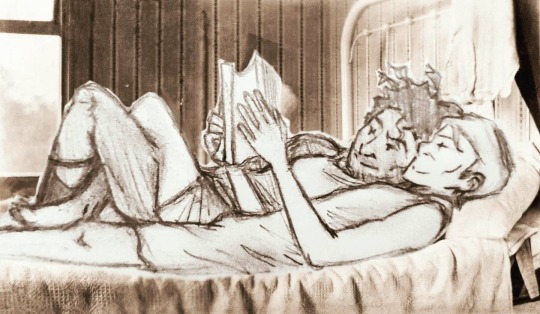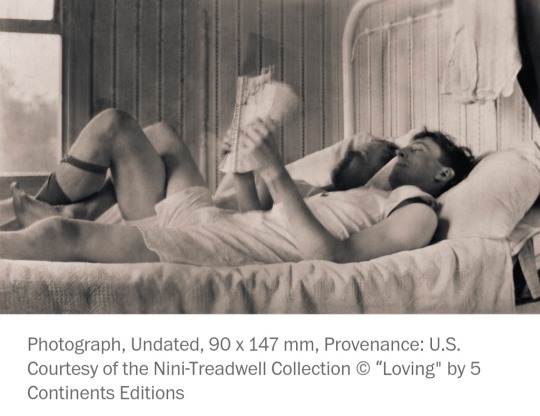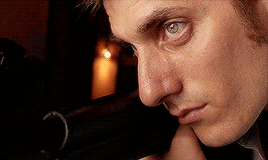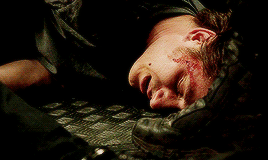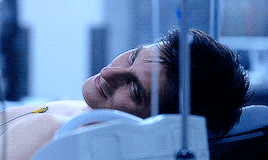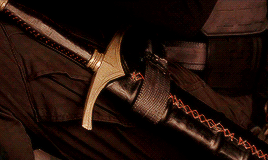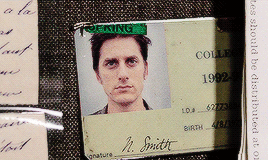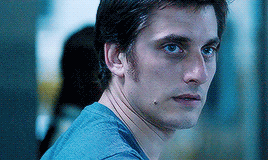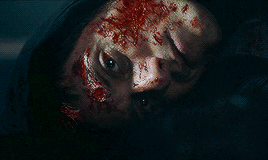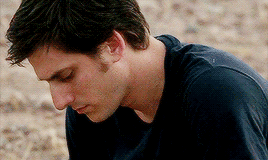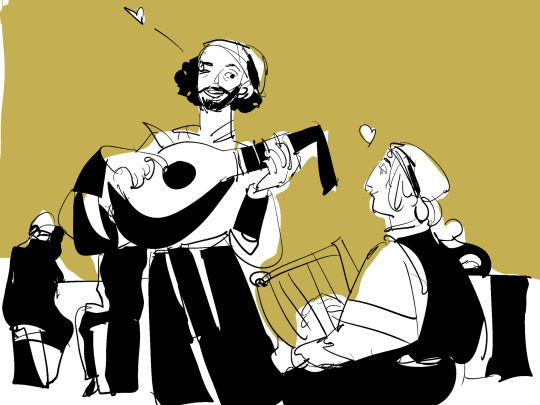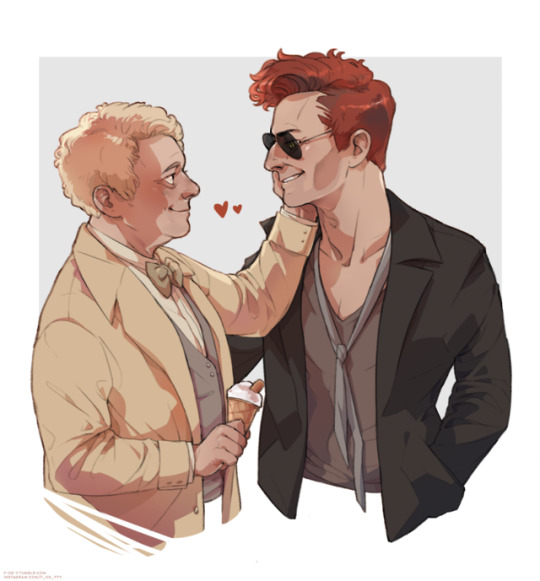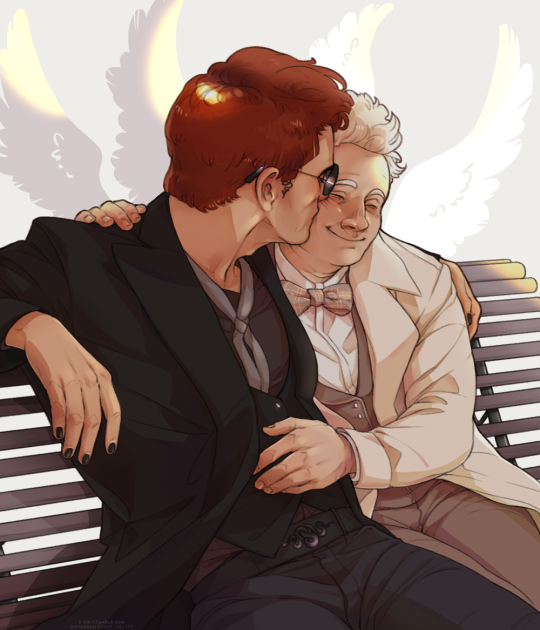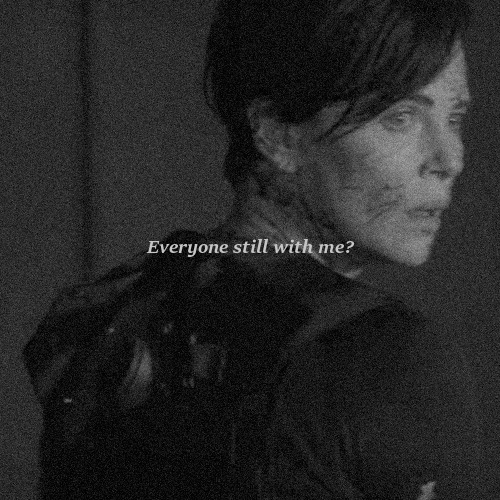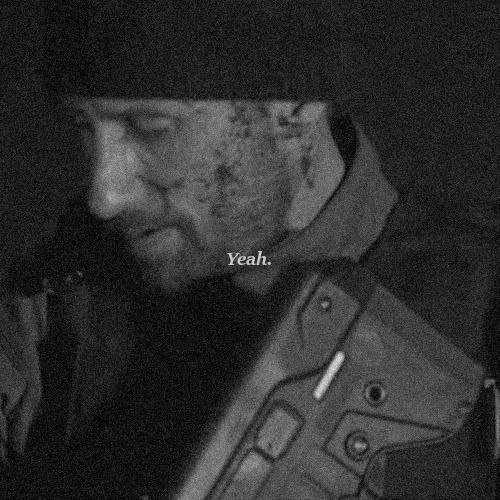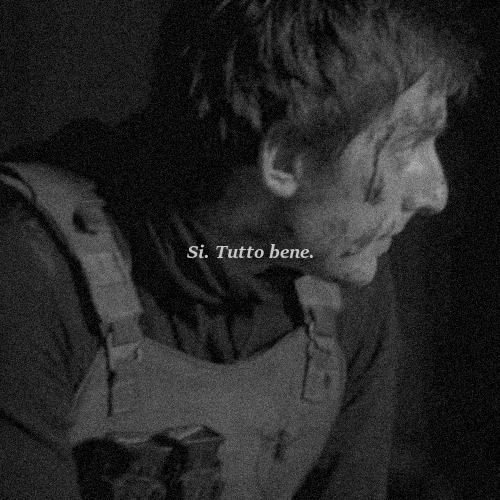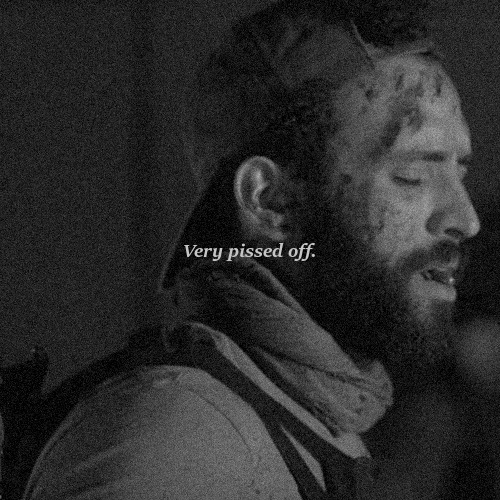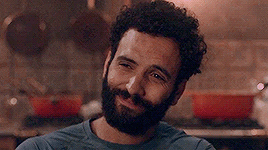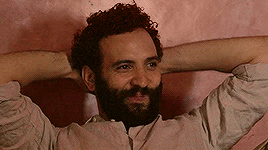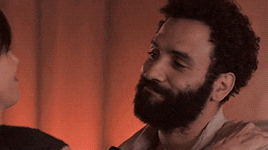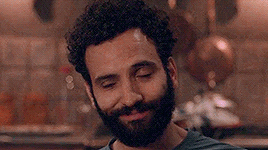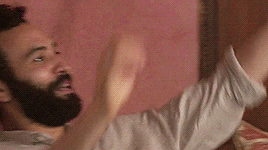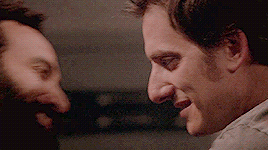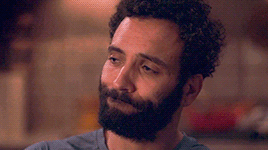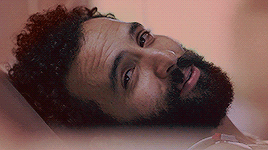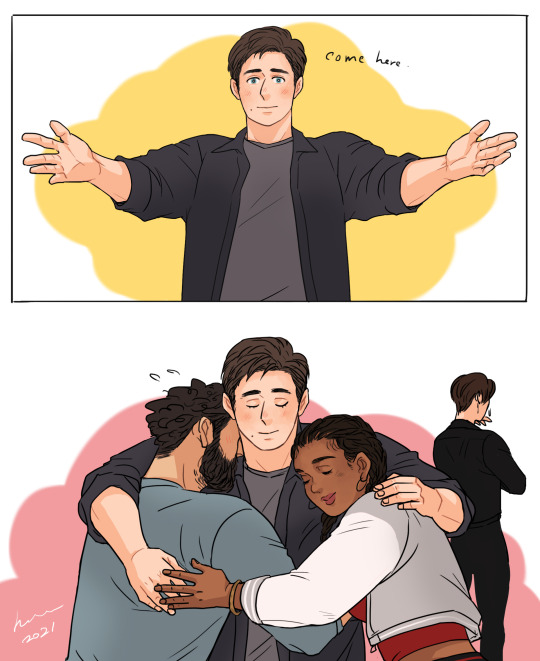Text
"You Defile Beautiful Things"
Making me like a white rich deadbeat dad takes a lot, so I want to talk about my mans Stede Bonnet and his character development because from the very beginning of Our Flag Means Death it took hold of me and it hasn’t let go. Like most of the fictional white men I have grown to love in my 30 years on this earth, Stede Bonnet makes extremely questionable decisions, is deeply flawed, and has a heart so full of love it spills out everywhere. His story is one of the most compelling in the show for me.
What I can’t take my mind off of (besides everything) is one of the most emotional and climactic scenes towards the end. Chauncey takes Stede out at gunpoint, and tells him he’s reached the only logical conclusion to everything that has happened in the season. “Stede Bonnet is not human,” Chauncey says with bitterness. Then, in a move that tore me apart, instead of getting confused or angry at this bizarre statement, Stede asks Chauncey to breathe so he can calm down, only for Chauncey to spit back, “You’re a monster. You defile beautiful things.”
I was shocked at the power of the accusation. The Badminton twins seem *hardly* the type to be concerned with beauty, yet here is Chauncey telling Stede he defiles beautiful things. The severity and sacrilegious nature of Stede’s monstrosity is plain and evident in just so many words. And then it gets worse when Chauncey proceeds to list the three beautiful things Stede has defiled the most: his twin Nigel, Stede’s own family… and Edward Teach.
My heart broke along with Stede’s, who begins to cry at this point (I love a good crier) and says Chauncey is right, and he deserves to be punished. The admiral’s point is further proven right when he missteps and falls, shooting himself in the face right in front of Stede, almost to demonstrate that everything Stede barely even touches in his attempts to be someone he isn’t gets obliterated. Stede is of course so afraid and shocked by the encounter it sends him right into his basest insecurities, and he returns to his wife and children without a word to Ed (not unlike the way he abandoned his wife and children in the first place), leaving all of us heartbroken along with Ed and shouting “THERE’S ONLY ONE EPISODE LEFT, WTF.”
I haven’t been able to stop thinking about this moment. I’ve been hung on the way Stede doesn’t fret at “Stede Bonnet is not human,” almost as if the accusation is not a foreign thought to Stede himself. This accusation is the ‘darkest hour’ of Stede’s arc this season, which is established from episode 1 with a very easy but extremely effective reference to Pinocchio when he reads the book to his crew. I knew then one of the main themes for Stede was going to be, if I may borrow from the Velveteen Rabbit, Becoming Real.
Stede Bonnet, the wooden boy who wants to be alive.
Boy, does the show deliver.
To dissect my feelings about this particular theme, which I adore to the bone, I want to look at three elements from the show which are close to Stede’s arc (and indeed spelled out by Chauncey), and which for me summarize what makes me go the most feral about his story: the nature of Stede’s monstrosity; the symbol of the lighthouse; and one of Stede’s main foils, our mans Ed Teach himself.
1. Stede, the Monster
“Stede Bonnet is not human,” says Chauncey. Stede agrees. I cry. This is the gist of it, isn’t it? Stede doesn’t believe he’s a person, or worthy of being called a person. He believes there is something inherently wrong with him. He isn’t a real man. He’s a fake. A monster.
The guilt within Stede is so powerful it leads him to leave Ed on the beach to return to his house. It’s strong and gripping and it has been present since episode one (and way before we meet him), but we’ve been so distracted by his good times at sea and his ever-closer relationship with his crew and especially Ed (he’d just kissed the man some hours earlier!), that we may have forgotten that Stede has that chain tied around his heart, a weight he picked up when he was a child and never put down.
Monstrosity is maybe a topic more easily connected to Ed, who has the whole “I am the Kraken” thing going on (more on that later), and whose issues stem from more violent conflicts/trauma than Stede’s. But this is why what gets to me the most about this scene is the nature of Stede’s self-perceived monstrosity.
Because, first of all, we also know that’s not a perspective he gained by himself. Because of the abuse endured from his father and his bullies, Stede has a long-running concern about being “inadequate.” It’s a very mild word for his issues but good lord is it descriptive. Because of course he feels inadequate to be a man. A Real Man. Stede’s main crime is that he cannot perform masculinity in the way it’s expected of him. He’s always been tender-hearted, imaginative, compassionate, nurturing, physically weak. Stede is unmanly. He likes fine fabrics and flowers and theatre and he is called a woman a couple of times to prove just how “emasculated” he is. He’s gay and falls in love with a man. We know in a patriarchal society none of that flies.
So when Chauncey tells Stede he defiles beautiful things, this means whatever Chauncey mentions is something he considers beautiful by patriarchal standards too. His brother Nigel makes a lot of sense. A brother you love is a beautiful thing to you, but Nigel was more than just Chauncey’s twin. Nigel was an example of a Real Man. As a naval officer for the British Crown, Nigel was strong and commanding, fearless and violent. He had disdain for weakness and he was racist and homophobic. Stede tells himself Nigel might even have children, turning him into the potential paterfamilias everyone expects a Real Man to be. Nigel was a beautiful thing because he was loved and respected by his brother and his peers, and he was loved and respected for not loving or respecting men like Stede. Stede didn’t want to kill anyone in the first place, but the fact Nigel dies because of him eats him alive because it adds to the narrative that there is something wrong with him, something that damages others. He provoked an ugly thing, he who by others’ standards has never been able to do anything right or be anything properly, and he ended the life of a man who is everything he never could be.
And it gets worse, because!!! And this is the crucial thing!!!! Stede never wanted any of those roles in the first place. He is caught in the middle between wanting to be approved by those around him and refusing to perform the rituals of something he isn’t. He knows he can’t change who he is and what he wants, but feels guilty to be and want as himself if that means he hurts others.
This is why the second item is Stede’s family. Stede obtained Mary through his father, never felt happy with the arrangement, and failed to be and do what was expected of him. He had two children but he can’t be completely present in their life either because of how dissatisfied he was with everything, because he couldn’t be truly himself. He can’t even play with the kids in the “right” way, either, indulging in the pirate fantasy. He had a house and a devoted wife and he disdained both. He very obviously does not have any intimacy with her, neither emotional nor physical. And the worst is he isn’t strong enough to stay put and endure it all.
Stede longs for a freedom he isn’t sure how to search for. He wants to be “adequate,” but he can’t be an adequate husband nor does he feel he can be an adequate father. He’s full of fantasies and frills and he feels so trapped by the world that tells him he’s been wrong all the time for wanting something different that he has the strong urge to rip his whole life apart, betray his contract with Mary, and run for the seas in search of something to feel, desperate for something Real to experience. Stede feels extremely guilty for this too, knowing he was causing pain and trouble and humiliating his family by leaving. But he was in a catch-22. If he stayed, he wronged them (and himself), because he couldn’t do what they expected of him without destroying himself, without becoming bitter and self-isolated, and hurting them in the process. If he left, he wronged them too and himself by becoming a monster. Isn’t a family what every man wants? Chauncey knows it’s so. Stede had it. It was beautiful, and no matter what he did, he defiled it.
Which leads us to the third on the list, none other than the precious Edward Teach. I love this part in particular because when Chauncey mentions him, he’s thinking about the greatest pirate’s career, brought to a stop because Stede, once again, was afraid and needed saving. The infamous Blackbeard represents another ideal of manhood, even if it’s one that goes against the law. But Blackbeard was feared, and strong and resourceful and quick to kill and ready to commit any atrocity to those who questioned his right to do so. Of course Chauncey would respect that fame, in a way. It’s still a patriarchal masculine ideal. All that time, however, Stede’s mental image of Ed is when he is finally beardless and open and vulnerable at the foot of their bunk bed. The point of view of looking down on Edward in such a state is intimate in a way Chauncey could never even imagine, and it’s why, for Stede, Ed hurts the most. One of the most terrible things I could think of is to bring pain and destruction upon someone I love dearly, upon someone who trusts me and doesn’t deserve the pain I can cause. I see that fear reflected in Stede. It didn’t matter that Ed told him it was okay, that it was his choice. Stede had heard Ed complaining about how there hadn’t been any passion in his life. He had seen Ed enjoying the pirate life. He had seen Ed forced to admit his illiteracy when he had to sign the contract right under Stede’s name with an X. Everything Ed had worked for during his whole life was destroyed in a matter of hours. Because of Stede, who had invited Chauncey on board in the first place, leading to the whole ordeal.
So when Chauncey mentions Blackbeard, Stede reaches a moment of extreme frailty and self-doubt, and he sees only one truth: he deluded himself about being able to change his life. He deluded himself about being able to find happiness the way he wanted. He literally touched happiness and kissed it that afternoon on the beach, but at what cost did it come? Ed is the most beautiful thing of all, and Stede defiled him by failing to be a Real Man, by being too weak to tell Chauncey no or too weak to accept death and forcing Ed to abandon everything for him. Of course Stede decides not to follow Ed, because Stede believes that Ed deserves better, and that he must return to the life he had had before, in an attempt to fit back into place where he “belonged.”
The fact that the show does keep Stede as the apparent source of tragedy for all these things is excellent character work, in my opinion. Because he is at the center of those events that seem to prove Chauncey is right while he voices Stede’s own flagellations. Stede cannot uphold those ideals he was supposed to embody, neither for his family nor for his crew. His father always told him he would never amount to anything, and that that meant he was a disgrace. He did everything halfway and never finished anything properly and so, Stede decides to go back, to try to fulfill the role he was meant to have all along, or maybe to be punished with the life he never wanted, but thought he had to have.
He returned to be a lighthouse.
2. Stede, the Lighthouse
We have a saying in my country that roughly goes, “If you can’t be an example to be followed, be a warning to be avoided.” I found it funny that they went with that sentiment almost verbatim when they mention the lighthouse in episode 4, and I think it’s rather fitting for Stede’s own journey, because of this burden he feels.
Stede is constantly connected to the symbol of the lighthouse. It’s in the background when he gets married, and then ever-present in Mary’s painting, a gift to Stede to remind them that they’re meant to be a lighthouse for each other. Yet, when he mentions this painting to Ed, he says that he was meant to be a lighthouse to his family, and that he failed at being a guiding light for them. Stede has been worried about this for a long time. If he can’t be that path to follow, he has failed at doing his job. It’s Ed who changes his perspective, and mentions that technically lighthouses are there to be avoided. Stede cheers up at this, because there is a truth here. If he can be an example of what not to do, what not to be, he surely is doing the job of guiding his family away from himself, away from his path.
It breaks me that Stede finds hope in being a warning to others, but it seems to bring him comfort, maybe because he doesn’t seem to be able to change who he is, and he definitely cannot change what he’s done. It might as well be of use to someone. Because, we have said, Stede feels he is always insufficient. Everything he touches, hurts. Everything he tries to do, fails. He doesn’t feel like he’s up to the task. He doesn’t fit. Like the lonely lighthouse, he isolates himself from others, especially when he feels vulnerable and unwanted, as he tries to avoid the painful truth that he feels inadequate, and that he might truly never be able to Become Real or to Be Enough.
I also like that Ed ends up keeping the painting of the lighthouse to remind himself of that same truth – opening up to Stede only broke his heart. Stede must be avoided at all costs. Likely, that opening up at all must be avoided at all costs. And like a lonely lighthouse, Ed emotionally retreats in the end and isolates himself as well, seeking protection in the strength of his pirate image, trying to save himself from what he feels.
AND YET!!!! Yet!!!!!!! In spite of it all, in spite of the tail of trouble that follows Stede… Stede brings light wherever he goes.
He treats the crew very much like his own children. He reads them stories, gives them outlets to express themselves creatively, encourages them to discuss feelings. He gives a little speech to Lucius about how he wonders what could happen if piracy wasn’t the horrible experience it is. He is actively trying to build at sea what he couldn’t have at home, and to create the type of environment where he would have liked to be in. And even though he feels he’s also failing at times, the crew begrudgingly begins to appreciate him for who he is, and to enjoy the benefits of those spaces he makes for them. By the time they do the “fuckery” against the Dutch, the Swede is singing his heart out and Frenchie is embodying his worst fears to use them against the enemy. The crew even worked out by themselves what to do, cooperating as a team and supporting each other. Lucius and Pete have a romance. And even Ed, who was trying to hype himself into murder, can’t of course even touch Stede with a thread of ill will. They end up crying in the bathtub, Ed spilling his most intimate secrets and fears, seeking comfort from the man he intended to send to doggy heaven. AND Ed does not only receive that comfort, he gets forgiveness, no questions asked!!!! From Stede himself!!!
Stede can’t help but be nurturing. My favorite symbol of this is his little fern, the loot from episode 1. When he steals the little plant at the beginning, it’s a little sad-looking and barely hanging in there. By the end of the show, when Olu produces the fern as proof of Stede’s pirating efforts, it has grown, and it’s greener, and full of life. Just like his crew, who are defending each other and his captain with a fierceness of their own. Just like Ed, who keeps saying meeting Stede has made him the happiest he’s been in a long time.
It’s the most tragic thing to see a character being so absolutely loved and supported by the people around him thinking he doesn’t deserve any of it, thinking he hasn’t been able to fulfill anything worthwhile yet. I was talking to my friend about this and she said it best: Stede is actively a source of life and goodness to those around him, even without meaning to, even though he sees himself as the monster, and a corrupter of good things. Stede is already beautiful, he just can’t see it.
I’ve noticed others pointing this out as well, but the only reason why Stede seems to be around when things break is that he is constantly involved in situations where he was trying to fulfill what others think is “beautiful,” what others thought was “right” and “proper” for a Real Man. Stede tried to watch his father kill a duck, and he couldn’t stomach it, and got verbally and emotionally abused for it. He tried to be married to a woman and make a family with her, but he couldn’t stomach it because he never loved her. He had to endure endless bullying for being himself and picking flowers, and ended up running away from the boys all the time, treated like a coward. The feeling of inadequacy is made worse because many of these people were actively trying to break what they saw in him that’s so different, and he thinks he has to do the same—that he has to break himself—in order to be the lighthouse they all told him he could never be. No wonder he feels relief when Ed suggests there’s no need to do that, since others can see who he is and avoid him if they so see fit.
My friend also pointed out that, when Stede finally decides to abandon that life built on others’ expectations, things actually start going better. We discover in the end that Mary managed to create a life she loves, because his unwilling presence had been actually harming her. Once Stede fails at the pirate captain thing and gets stabbed and almost dies, he meets Ed, and falls in love for the first time. During their time together, Ed starts opening up more, and starts getting out of his depression and is more the way he wants to be. The Revenge’s crew still gets regular pay and a supportive environment. Stede makes friends with Lucius and Olu. Everything keeps going well and getting better right until other forces—who despise the “unmanliness” they see in Stede like a disease—intervene again, and Stede listens because he’s been conditioned to listen to the abuse.
The moment Stede feels vulnerable and insecure and tries to undo all of this progress by returning to Barbados, things go extremely sideways once again. He can’t connect with his children, who feel confused by the whole thing and resent him. He can’t connect with Mary, who had found her art and a supportive community and a boyfriend in his absence, and sees all is threatened again by his presence. Stede even ruins Mary’s art exhibit by being drunk and mean and reacting with violence (which he seems to recognize was out of place, a testament to Stede’s ways) towards Doug, the man who is technically cuckolding him but, he can also recognize, is good to Mary. Stede begins turning bitter as he restarts to make everyone around him unhappy through his unhappiness and forced position as a patriarch, even if he was an insufficient one. Not to mention that back on the Revenge, Ed spirals back into depression and has several crises of his own which end up in half the crew being stranded or kidnapped (and Izzy also loses a toe, though I’m sure he’s happy about that bit).
By trying to be someone he isn’t—by trying to uphold at least some of the patriarchal ideals of manhood he never wanted to be in the first place—Stede does end up almost destroying completely those things that were actually beautiful and good. Some of it was salvaged by the end of the season, most of it remains to be salvaged for the second season (fingers crossed), but this is only possible for one reason, and one reason only: Stede accepts the truth.
The actual truth. This is one of the reasons I love Stede so much. Right at the end, when he sees the way he’s hurting again his children and Mary, and the way he’s hurting himself in the process, he decides to open up about it. He decides to admit he can’t be what his society told him he had to be. What he promised he was going to be. But he does an extra step beyond this. He resolves the guilt he felt about unfulfilling those expectations.
It takes him getting almost murdered to realize that they couldn’t shadow the sun with a thumb (another saying of ours). When he stops isolating himself—when he stops trying to be “the lighthouse”—things start going well again. He gets friendly with Mary, and they talk openly about their feelings and desires and resentment. He reconnects with his children, and ends up sharing half a petrified orange with his daughter, a symbolic bridge between what he’s leaving and what he’s looking for.
Mostly, Stede learns a tough lesson that is difficult to accept sometimes: in order to Become Real, he has to get rid of the weight of others’ expectations, especially from those who were supposed to love him or support him but didn’t. It’s that simple and that hard. It’s the only way he can actually become free where it matters, inside. It’s the only thing that lets him be who he truly is, and fight for what he wants and for who he loves.
Stede starts the season thinking of himself as a monster because, among several reasons, he can’t be a metaphorical lighthouse. It turns out, of course, that he was indeed bringing goodness to those around him just by virtue of being himself, he just didn’t fully appreciate it. By the last episode, with a strong acceptance of who he is, a better understanding of what he feels, and a certainty he hasn’t exhibited yet through the story, he finally embraces one final truth.
He’s not a monster, he’s in love. And he’s in love with the most beautiful man of them all.
3. Stede, the Man who Loves Edward Teach
LISTEN!!!! I have!!!!!! SO MANY FEELINGS about this!!!
Because throughout the show, Stede shows that he understands that there is something terribly wrong with the way men are expected to perform masculinity, and he rebels against that. He refuses to abandon his clothes and his books. He refuses to play along when folks like Calico Jack or Nigel try to make a show of their own manliness. Stede refuses almost at every turn to perform toxic masculinity, and refuses to have others mistreat his men for not exhibiting toxic traits or “manly” skills.
But he can’t seem to find resolution for himself amidst all this. He’s haunted by his own guilt, he’s haunted by the chain around his heart and the expectations that came with it and the people he feels he’s hurt in the process. He’s trying to find a way to cut it and fumbling a bit in the dark, but my mans was trying from even before the show starts. He was trying to leave the wooden boy behind.
To help Stede grow in the process, the narrative gives him a series of foils so we can compare and contrast and so he can learn from them. Lucius is probably one of the main ones (I have so many feelings about Lucius!!!), and even Izzy (the man most obsessed with his masculine image is the one Stede can’t stand at all, and shows no fear of him). But today, and especially because of that climactic scene with Chauncey, I want to talk about Edward Teach. It is their relationship what gives Stede that final push to face the truth.
Ed comes along with his own tail of issues, but he also comes along with a lot more figured out than Stede. He clearly is aware of his queerness, and for that he seems more comfortable with it than Stede. He is the first to notice the romantic tension between them, and he is the first to initiate their kiss (twice!). However, he understands the rituals of violence better than Stede as well, and has a better way to use them in his favor. Of course, his background is very different from Stede’s. A clear example is that Ed can’t read or write, but he never seems to feel insecure about that fact, even if he admires Stede’s love for reading, which is also a fundamental part of his personality. And unlike Stede, who inherited everything he owned, everything Ed has he earned through hard-work, intelligence, and literal fighting. Ed is masculine in a way everyone (both fellow characters and the audience) can admire more easily because it’s shown as a slightly more balanced version between extremes. Ed’s knowledgeable and skilled and commanding, but he exhibits a self-assured charm that makes him easy-going and likable. He is known to be bloodthirsty and he makes fun of the Spanish for dying calling to their god, but he speaks softly to Stede and constantly touches him gently. He has a strong sense of style and has very expressive mannerisms, but he wears leather and sports a full beard that tells you he’s a weather-beaten man of action. He looks almost effortless in his coolness, unlike Izzy Hands, for example, who is constantly trying to be feared, or unlike Stede, who can’t make himself intimidating as much as he tries.
This mixture of open acceptance and honesty is what makes Ed so responsive to Stede’s curious ways, but it also means he is trapped in a catch-22 of his own, between the fame of being cruel and terrible and the truth that he doesn’t want to be that at all.
We don’t see a lot of his truly rougher edges until later in the season, since Stede’s built-in instinct to share and his emotional availability makes him responsive to Ed’s softer sides from the start. Thus Ed, who often keeps to himself that side of him, feels safe enough to share around Stede. They share the weight of having to perform, and he finds in Stede a similar soul searching for a way to be himself. Their differences and common ground is what makes them perfect to encourage growth on each other. They decide to start by teaching each other the trick of their trades (piracy and nobility), but it evolves into so much more.
When Ed teaches Stede about how to be an effective pirate, Stede realizes it entails a lot of performance to scare the opposition, but is mostly a life full of violence, drinking, and emotional neglect. Oluwande also expresses this sentiment to Stede early on, warning him that this lifestyle was not a choice, but something he and Jim had needed to do in order to survive. From the get go, the line between “being a Real Pirate” and “being a Real Man” is blurred, and the parallels deepen more and more as the show progresses, leading us to see the way both Ed and Stede have influenced each other by the end of the season.
Stede almost successfully pulls off that type of masculinity when he goes back to Barbados, both when he impresses his neighbors with his tales of blood and when he attacks Doug at Mary’s exhibit. For Stede, though, the anger and resentment within him don’t seem to ease through these demonstrations of machismo, mostly because that’s not who Stede is. He never was. And it’s obvious pretty fast that he can’t fix all the things that keep going wrong around him by acting out in anger.
In parallel, Stede also teaches Ed about the epic highs and lows of nobility, and provides him with a space where he can explore other sides of himself. Ed wears flowers in his hair and gets some fancy pants and tells ghost stories and enjoys marmalade. He opens up about his feelings and learns to recognize and honor the effort from others to make him feel included. When Stede leaves him at the beach, and Ed feels abandoned and extremely vulnerable, he first tries to do something different from anything he’s done before, and leans on what he learned from Stede about expressing emotions through art and talking through his feelings. He even proposes a talent show. But like Stede, Ed is also in his ‘darkest hour’, and where Stede only finds support back in Barbados, Ed finds some resistance from Izzy, who hates the “unmanliness” that Stede “rubbed on” his captain. Ed, marked by the life he has lead, and so scared he doesn’t know what to do with the abandonment he’s experiencing, ends up choosing to embody everything he hated about Blackbeard the Legend, and fully becomes The Kraken.
Ed’s life has been marked by need and violence, and when he admits to Stede the origin of the Kraken—that he killed his own dad when he was just a boy—out of need, to stop him from hurting his mother—he also accepts this is the thing that scares him the most. What he, Edward Teach, can do to other people, is what scares him the most. This is what makes him the Kraken of lore. “I’m not a good person,” he tells Stede. This is what makes him a monster.
Ed’s monstrosity is a nice parallel to Stede’s. Like I said before, his issues with feeling monstrous are a bit more obvious than with Stede because it’s more tangible, and more directly named. It’s an absolutely heartbreaking moment to see him so hurt he decides to hurt others in an attempt to save himself, because we know that he knows that’s not who he wants to be, either.
This is not very different from Stede’s own fear, who gets accused of being a defiler of beautiful things. Sure, Ed was defending his mom, but it says a lot about Ed (and the show) that he still sees it for what it was, as an act of despair and horror, and doesn’t try to frame it as one of bravery or heroism.
We see yet another parallel here - Stede received violence from his dad, but unlike Ed, he never felt like he had to act against it to save himself or someone else. Ed, in a more extreme form of that abuse, saw himself forced to commit violence against his dad to preserve his family. All these circumstances, however, led him onto the path of piracy, which Ed seems to be ashamed of. There are many other horrible things he has done in the past (like burning that ship with the crew inside), and doesn’t really want Stede to find out about them because he is afraid that Stede will see how monstrous he is, and stop wanting to be with him, that he would stop loving him.
It’s however, a moot fear. When asked about him in Barbados, Stede claims that Ed is “absolutely lovely.” Stede knew Ed tried to kill him, knew the type of things he had done, and still accepted him in full. Stede respects that Ed has a history, and sees beyond the masks and reputation to fully embrace Ed for who he is. This drives me crazy with emotion because, similarly, Ed never sees monstrosity in Stede either. In spite of Stede’s own fears, despite that terrible scene this ramble started with. Quite the opposite.
When they’re under the moonlight at the end of episode 5, Stede says the line where it’s most obvious he thinks Ed is beautiful. He tells Ed that he “wears fine things well.” The framing of the scene works on various levels, not only showing Stede’s attraction for Ed (he basically called him handsome, for starters), but also the depth of their growing connection and the romantic tension brewing between them. Ed feels it—seems very aware of it, in fact— and his breath gets stolen away by the moment of tenderness. He feels seen, even though Stede doesn’t know the full length of Ed’s feelings about his little piece of red fabric. It’s important that in an episode that shows the many class differences between Ed and Stede, there is also a moment where they stand with each other as equals. It’s a shot full of intimacy where Ed allows Stede to hold the old fabric, the embodiment of the secret desires and insecurities of his heart, and Stede replies in kind by treating it with gentleness, putting it on display on Ed’s chest, saying it becomes him to have it all on display—his heart and his past and his emotions are all fine things to wear with pride. Ed, overcome with emotion, almost (rightfully) kisses Stede right there and then, but refrains from it in the last second. Sadly, we learn later, Stede wasn’t fully grasping the meaning of those gestures, and it takes him a while to understand that it all meant something quite happy and complex and simple all at once: that Stede is falling in love with Ed. And that Ed is falling for him too, and realizes what’s happening between them way before Stede can put it into words.
The beauty of the moment only enhances the contrasts and similarities between them, and it fuels the pain later, when, overcome himself with doubt, Stede thinks he’s hurt Ed irreparably and decides to leave him behind.
The show is very adamant in this and many ways about the importance of feelings, especially love. Through Stede’s relationship with Ed, we see another key point in Stede’s arc, one that I want to touch upon. Toxic masculinity often dictates that displaying affection and emotion is even less acceptable than engaging in certain behaviors, depending on specific contexts.
Calico Jack (Calico “I construct intricate rituals which allow me to touch the skin of other men” Jack) expresses it himself when he says he’s had “dalliances” with Ed because “anything goes at sea.” In this way, he dismisses the importance of their history together and highlights the lack of emotional investment in the act. This is consistent throughout the episode. When Ed responds to Jack’s betrayal with anger, because his supposed friend just sold out his new friend, Calico Jack replies by making fun of Ed’s emotions, dismissing the importance of any connection he may have with other men in the process, himself included, and excuses his behavior as natural and necessary, to avoid Ed from falling into “disgrace.”
However (and this is one of the reasons I love Ed so much), Ed has learned a thing or two through the season, particularly from his connection with Stede, about the importance of defending those emotions, and adamantly refuses to behave like his relationships with other men, and especially his relationship with Stede, don’t matter. He immediately jumps back into the water and comes aboard to help the Revenge. This moment is paramount.
Ed had felt insecure about Stede not liking him because of the type of man Ed has been (he never heard Stede saying “Ed’s past is Ed’s business,” which I’m very !!!! about), and tried to hide those fears until he had no other real choice than to look at his situation in the face. He first tried to one-up his fears by taking himself out of Stede’s life before Stede had a chance to kick him out, only for Ed to realize this wasn’t something he could live with. After understanding that Calico Jack was manipulating him to separate them on purpose, Ed chooses to return, even when things were getting extremely bad (especially then). Incidentally, I love that Fleetwood Mac’s “The Chain” plays at this turning point, and the lyrics echo Ed’s insecurities with the lyrics (“if you do not love me now, you will never love me again”).
Of course, Stede, once more, fully accepts Ed back, as he did with his bathtub confession.
The build-up of their relationship—showing each other over and over again that they’re willing to accept the other, that they genuinely like each other and are willing to teach and learn from the other, to see each other blossom and grow—is what makes that scene on the beach at the end so tragic.
Ed trusted Stede because Stede had been gentle and constant, no matter what he saw Ed do or say. Ed trusted Stede to love him back and run away because he said he’d do it. Ed was finally happy, heaven knows in how long, and he had expressed that fact in a million ways, including kissing Stede.
And then, during yet another horrible and traumatic event, all of the guilt and self-hatred Stede hadn’t been able to work through return. Even though he had painstakingly built a solid relationship with Ed, even though he had fostered a place where their love could blossom, Stede betrays the man he loves without a further word.
Edward Teach, left on a beach, is a poignant moment. I was devastated, but it made so much sense. It made so much narrative sense. Because Stede’s story doesn’t end there, of course. Neither does Ed’s.
The scene when Stede comes out to Mary points at the fact he had no framework to know he had fallen in love with Ed. He clearly wants to be with him, he clearly wants to share spaces and time with him, and share an intimacy neither of them displays with other people… but, unlike Ed, Stede couldn’t fully process what it meant. This is unsurprising (and very sad), since everyone tried to beat feelings out of Stede from an early age. It’s really hard to identify feelings if no one teaches you how to do that, and even more if no one allows you to express feelings that are considered gentle or effeminate.
I go feral because it doesn’t take him much to realize his mistakes. As soon as Stede’s able to open up—as soon as he’s able to accept that he was hurting Mary and the kids—as soon as he has some guidance about what love feels like—as soon as he is able to name the fact he’s fallen in love with Ed—he is able to accept the reality of the situation. He sees there’s no shame in his failed marriage, because neither of them had wanted it in the first place. He understands he was right all along to want his freedom, and devises a way to apologize and make things as right as he can with Mary and their children. He sets out to find Ed again, because Stede no longer believes he has to run away from what his heart wants, now that he knows where the North lays. It all falls into place so quickly my chest wants to burst. And he sails off.
Stede Bonnet becomes real on that beach, on an afternoon of 1717. He becomes free. He wins this round, by virtue of being himself, but it would also have been so different without Ed Teach, without his candor and his humor and his tenderness and his love and his anger and his boredom. And keeping with the spirit he showed from day one, Stede is trying very hard to fix everything again, this time by wearing his heart on his sleeve, and going back to sea to find Ed to, hopefully, make things right with him too.
Isn’t it the most beautiful thing?
He’s ALL that. He’s a white rich man who made so many mistakes I can’t even count. A guy who in his self-absorption and misery hurt others. A man traumatized and emotionally stunted. A man so loving it was tearing him apart, and so convinced of its worth he jumps on that dinghy to face the ocean alone.
It’s not a difficult question anymore – Stede wants to live. And by god, he will try.
I just love Stede Bonnet so much.
1K notes
·
View notes
Text
It is actually extremely important to me that y'all understand the importance of the talent show subplot to the structure of ofmd being not just a gay romcom but a story fiercely thematically opposed to toxic masculinity and amatonormativity; how Ed the Emo crying into his blanket fort and silk gown writing sad boy poetry music is the most emotionally healthy he’s ever been and a hairsbreadth away from sustained happiness.
Which is a hard sell with Stede still playing house and straight man a million lightyears and then one (1) rowboat trip away, but I swear the reason that Ed has this subplot instead of disappearing for twenty minutes of B-plot about mutinying against Izzy only to swan in as The Kraken at the end is because Our Flag Means Death correctly believes with its whole big gay pirate heart that Ed doesn’t need Stede to be happy.
Keep reading
3K notes
·
View notes
Photo
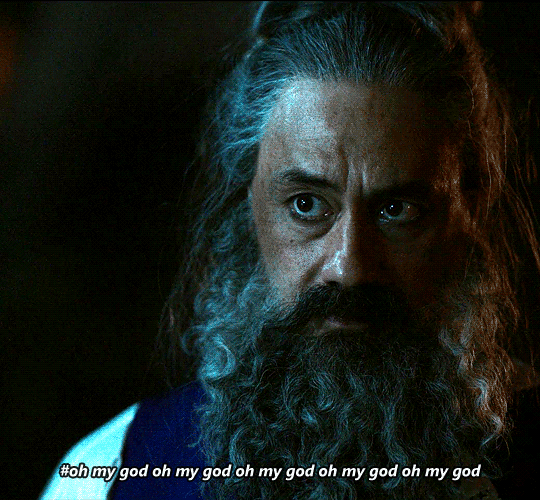
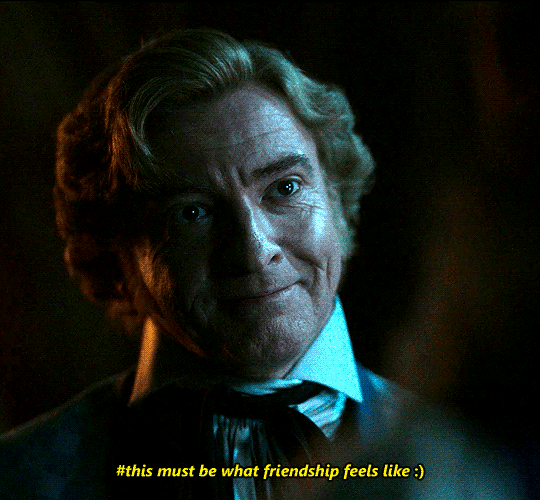
#omg i think i like you | Our Flag Means Death 1x05 The Best Revenge is Dressing Well aka i can’t stop thinking about this post
8K notes
·
View notes
Photo
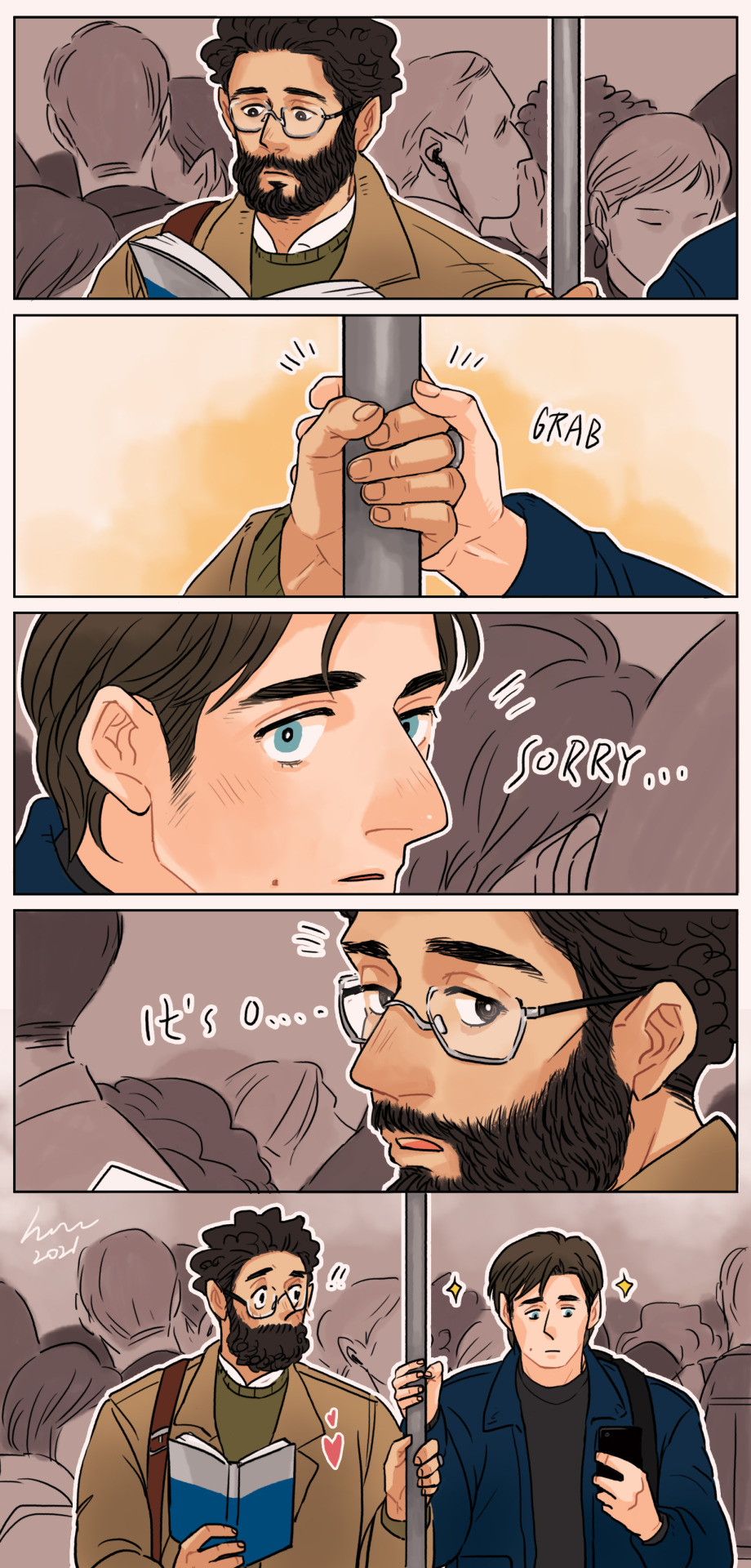
Love Actually
secondary school teacher!Joe and poor PhD student!Nicky AU
little detail:
Nicky work at the little Italian restaurant.
1K notes
·
View notes
Photo
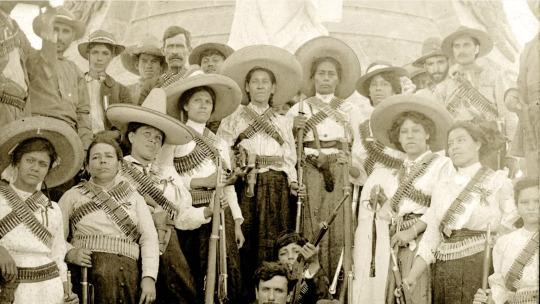
The Old Guard: Images Through Time
Sebastiàn, Ana, José, and Nicholàs | Mexican Revolution (November 20, 1910-February 5, 1917) with Las Soldaderas, 1911. Ciudad Juarez, Mexico.
(Fighting with Las Soldaderas for freedom, and equality, when women in Mexico had neither.)
93 notes
·
View notes
Text
Gotta admit I find it very funny when post-canon fics follow the line of "what if the gang or just Nile wanted to get degrees?" and then set them in USamericans colleges,,,,, the ones that are expensive AF, require like your first born and a genetic test to prove your worthy of even setting foot in it and are live-in??? Which is a major risk for people figuring out their healing?? Like, other countries have free state universities that require proof of citizenship (or even pose as an immigrant, which would probably be easier to fake) and that you finished highschool, maybe a test for placement and like,,, that's IT, come right in, live wherever you want, take your time
424 notes
·
View notes
Text
Joe loves Nicky’s smiles.
In fact, both kinds manage to make his heart stop abruptly by simply seeing them.
There’s the subtle smile which can easily be missed if you don’t pay close attention to Nicky. It is nearly hidden in the corners of Nicky’s mouth as if he couldn’t decide whether to smile openly or just keep it to himself. And when one corner is higher than the other, turning Nicky’s smile into an adorably crooked thing and giving him a particularly mischievous look, Joe is melting like snow in the heat of summer.
And then there’s the smile ending in Nicky’s individual laugh.
It is not just a laugh but the symphony of Joe’s heart, letting everything else fade into the background. Whenever Nicky finds something really funny or indulges in happy memories his smile changes into the loveliest giggle. But Joe’s favorite part is the snort. Each of Nicky’s honest laughs comes to an end with a mix of a snort and an exhalation and Joe cannot express which feelings spark in him when he hears it.
However Nicky is smiling, it can always be seen in his eyes, comforting and supportive for the ones he loves.
148 notes
·
View notes
Photo

“Home Alone in the background” (no one has seen this movie except Nile)
Merry Christmas!! Buon Natale!!
4K notes
·
View notes

